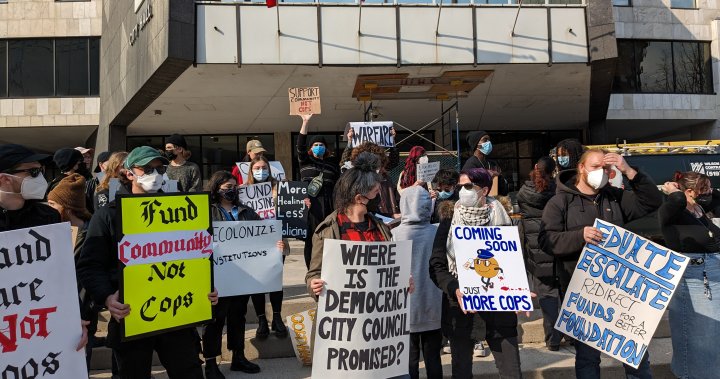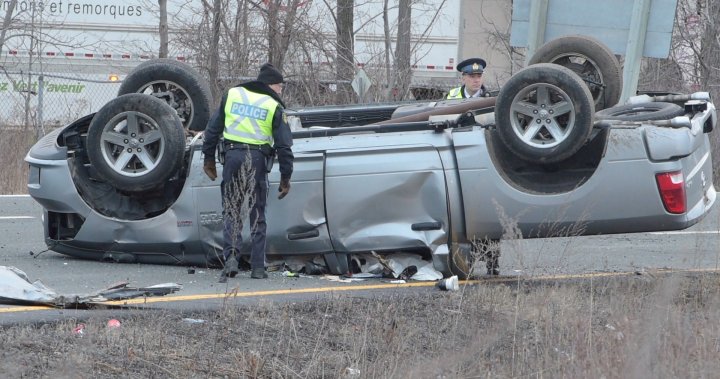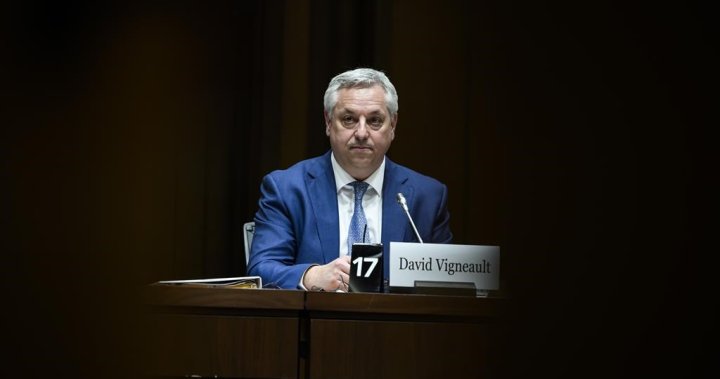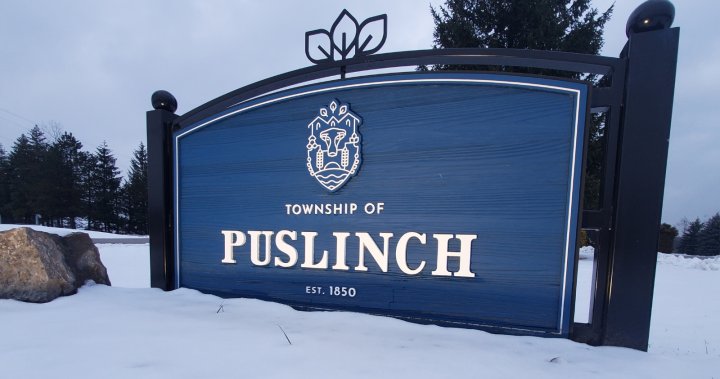A public participation meeting lasted hours on Tuesday as residents took the opportunity to voice their concerns about the upcoming multi-year budget, with the vast majority of speakers denouncing a potentially historic increase to the police budget specifically. A demonstration was also held outside of City Hall.
On Wednesday, Councillor Anna Hopkins confirmed she will be introducing a motion at Thursday’s council meeting to trim the London Police Services budget by five per cent.
While the addition of the motion to Thursday’s council agenda follows the public participation meeting, Hopkins had been working on it beforehand and the motion is dated Feb. 21.
She said neither the response nor the turnout at Tuesday’s meeting were a surprise to her, after receiving numerous emails on the budget. She said her main focus was on addressing residents’ comments that the proposed 8.7 per cent tax hike is simply too high.
“The significant increase, over 30 per cent in the next four years, that’s a significant increase and I’m hearing loud and clear from residents: how is that going to be affordable?”
Hopkins’ motion is to reduce all five business cases in the police budget by five per cent, which she said would reduce the tax levy by 0.1 per cent and also provide for more conversation at council.
“We heard loud and clear last night at the public participation meeting, that we weren’t asking questions or having those conversations. And, I think we need to. We need to really understand and be responsible, I guess, for the moneys that are being allocated.”
Of those who addressed the police budget at Tuesday’s public participation meeting, eight expressed support (including two small business owners, two members of a downtown condo group and two members of the London Police Services Board). Over two dozen speakers expressed displeasure with the proposed police budget.
Many of those speaking against the proposed police budget expressed disappointment with police and some councillors for what they alleged was using fear-based rhetoric to garner public support.
In making the ask, police chief Thai Truong pointed to the Crime Severity Index, calling London “the third most dangerous city among the big 12” police services in Ontario. However, at Tuesday’s meeting, Ward 13 resident Andrew Weiss, who described himself as having a masters in theory and criticism and over a decade experience as an academic editor, urged councillors to use “good data.”
“The City of London is not a dangerous city in a way that justifies the increased budget of 30 per cent… If the London Police Services wants to try to inspire fear in the citizens of London, we should not take that as a good guide for action.”
Breaking news from Canada and around the world
sent to your email, as it happens.
He also pointed to a study, Police Funding and Crime Rates in 20 of Canada’s Largest Municipalities: A Longitudinal Study, which he said concluded that “no consistent associations were found between police funding and crime rates across municipalities, and overall net increases in spending per capita are not associated with greater net decreases in crime rates.”
Adrian Zylawy, who lives and works in downtown and south London, said that other data in the index that Chief Truong has referenced actually shows that, outside of Toronto, “London has seen the least amount of growth in the index over the previous ten years, coming in around six per cent. That’s less than half the growth seen by Niagara, Barrie, Oshawa or Ottawa and glaringly less than Guelph and Kitchener.”
“Another important point that I haven’t seen raised in a public forum is the Ford government’s recent dropping of the requirement for post-secondary education to become a police officer. Anyone who knows me knows that I’m the last person to equate post-secondary education with intelligence or competence, but it is relevant in this instance because this will unquestionably lead to younger applicants who may not have the life experience or the level of learned critical thinking that has previously been seen as a necessary bar for entry.”
As Anna Maria Valastro said, “it’s misleading to tell your constituents that unless they get $700 million in four years, that somehow they’re going to be unsafe. That’s a lie.”
Many of those opposing the proposed police budget said they would like to see the London Police Services treated with the same request for fiscal restraint as social services have faced. In particular, the force’s plans to purchase another light armoured vehicle, or LAV, were repeatedly derided.
“Yes, we have crime. But to say that we have the type of crime that requires a tank is ludicrous on its face, no matter what data was cherry picked to create the dangerous city scenario,” said Old South resident Vincent Lubrano III.
“The ironic thing is that if the half-a-million was spread around to the right organizations, this would help the police far more than any tank.”
David Pasquino, CPA, said plans to purchase the LAV as well as another drone, a vehicle dedicated to drones and electric vehicles were examples of “niceties” not necessities.
“As someone who puts together annual budgets, I know it’s not easy. But it is always possible. Always,” Pasquino said.
“Instead, I feel like they have us in a chokehold, forcing their budget down our throats, reaching deep into our pockets to pay for it. Yes, more personnel are needed, but 189 positions?”
Resident Kristina Bendikas pondered how just one per cent of the proposed police budget, or $6.72 million, could impact paratransit, public transit, social programs, housing, libraries, museums and the performing arts. She added that of all the cuts council has made in the budget process, it hasn’t even amended the police budget by 0.07 per cent, or the cost of a LAV.
“I know that not every budget request can be fulfilled, but no single request should be held up as untouchable in the way that police budget request has been.”
Some speakers also raised concerns surrounding community trust in policing.
A resident named Kade said “I’ve seen unhoused people being forcibly removed from warm buildings for the crime of simply existing” while a man named Robert shared a personal story about trying to file a missing persons report with the London police. He said he was ignored and not listened to and eventually filed a report with the Toronto police service, which he claims finally got London police to call him back. His son is still missing, he added.
A trans youth shared that when their mother reported that they were flashed, police repeatedly probed them to describe the flasher’s genitals.
“How would that help? Is that how the LPD identifies the people that they take in, looking at their genitals? When I said I didn’t want to think about it, she kept pushing me.”
Global News has not verified anecdotes of personal interactions with police.
Dirka Prout, who ran for the federal NDP for London North Centre in 2019 and 2021, said some of the earmarked funds are supposed to go towards rebuilding community trust.
“How is this substantial increase going to prevent what happened to Debra Chrisjohn or Caleb Njoko? Trust can be strengthened for next to nothing by treating members of the Black and Indigenous community with dignity and respect.”
Many of those in favour of the police budget spokes about increased demands on police and struggles facing the downtown core.
“I hear of robberies, vandalism, graffiti, theft on a regular basis. It’s not like it used to be. Crime is on the rise,” said small business owner Peter Watson.
“If the message in our community is crime pays, then for some business owners it’s easier for them to say no thanks and walk away.”
Speaking on behalf of a condo advocacy group, Douglas Doward said the service has been underfunded and “criminals are emboldened by how disadvantaged our London police are in terms of preventing and arresting them.”
Both police services board members who spoke pointed to extensive consultations leading up to the creation of the proposed budget. Nancy Branscombe, also a former city councillor, also highlighted that the asks were tied to increased transparency and accountability.




